Australia is increasingly becoming more of a multicultural nation and this is impacting the ways we die and say goodbye.
Recently released data from the 2021 Australian Census revealed that our most common religions are now:
If you are attending a funeral, memorial service or wake with religious customs and cultural traditions that are unfamiliar from your own beliefs or background, having an understanding of what to expect and how to dress and behave will ensure you don’t upset your fellow mourner.
To help you feel more comfortable when attending a funeral from another culture or religion, here’s a guide to some of the different customs and traditions associated with death and funerals.
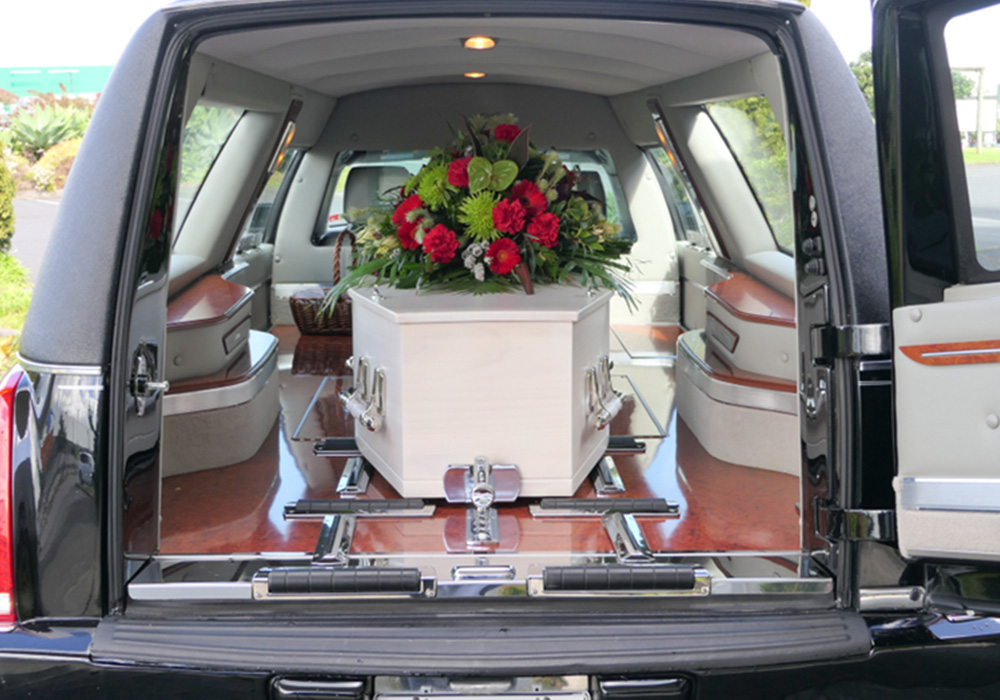
Although there is a wide range of interpretation of the meaning of the Bible within the different denominations of the Christian faith, the core of the Christian faith is belief in an afterlife. For Christians, death isn’t something to be feared as they believe they will meet with God and Jesus in heaven after death, as well as other Christians who have already died.
Christian funeral services in Australia are therefore usually held in a church, conducted by a priest or a minister of the clergy and include readings from the Bible, prayers and hymns.
Most Christians can be cremated or buried as the Bible does not specifically ban cremation, however the more conservative diocese of the Catholic Church sometimes still stipulate that ashes must be buried, rather than scattered, after cremation.
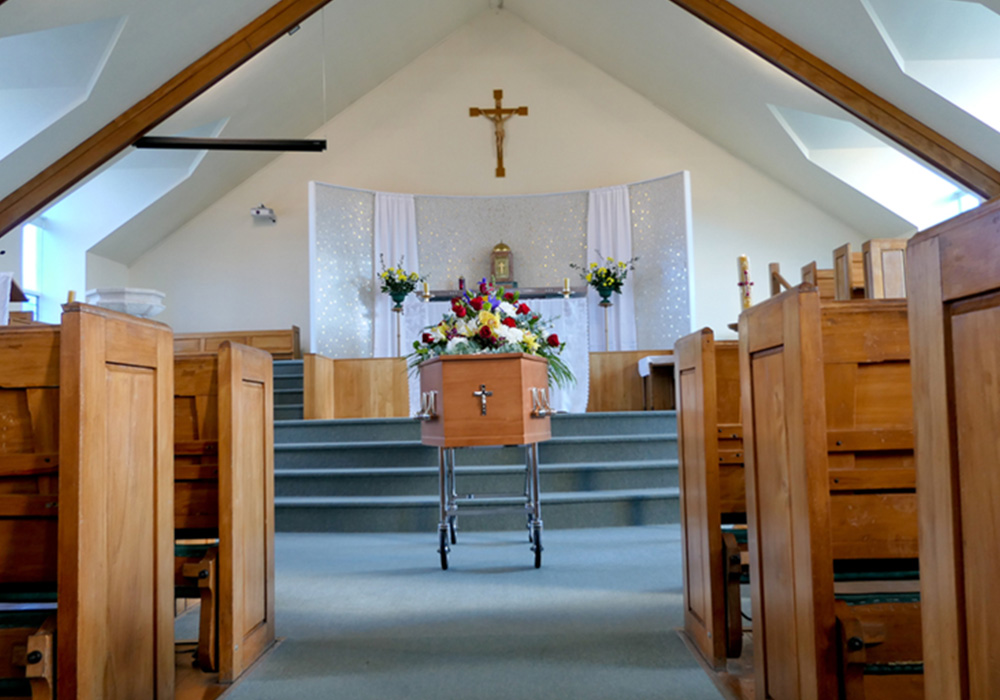
Nearly 40% of Australians now identify their religious beliefs as “no religion” at all. So, what type of funeral service and wake do you have if you have no religious beliefs?
Non-religious funeral services are a great opportunity to really “go your own way” and create a highly personalised farewell and wake. This type of farewell is usually led by a funeral celebrant and while it can be held in a non-religious chapel at a crematorium, many people nowadays prefer to hold it in a location of significance to the person who has died, such as at the beach, in a park, at a surf club or even at the family home.
All aspects of the service can be personalised and directions will usually be given regarding colour to wear – usually not black. Music choices are often more contemporary and readings may be a favourite poem or quote. There may be several eulogies and video or photo presentations.
Personalised or environmentally friendly coffins and urns are also increasingly becoming popular too.

Like Christians, Muslims have a strong belief in life after death and take comfort in the belief that they will see their loved ones once again in Paradise. They believe death is predetermined by Allah (God), and the exact time of a person’s death is known only to Him, with death marking a transition between the material realm and the unseen world.
There are four stages to a Muslim burial, which is known as the ‘Janaazeh’, with the funeral and burial usually occuring within a day after death.
Stage 1 – Ghusl – washing the body. Once a person dies the body is taken to a mosque where family members and members of the mosque wash it. Immediately after death the eyes and mouth of the deceased are closed and their body is covered with a sheet with their head positioned to face Mecca. The body is cleansed at least three times, either by their spouse or a same sex family member.
Stage 2 – Kafan – shrouding the body. The body is covered in plain shrouds; three pieces for men and five for women.
Stage 3 – Solaah Jonazah – the prayer. At the funeral prayers are said so Allah can give forgiveness to the deceased and safe passage into the afterlife. The Imam will pray facing the body, with men standing behind and women watching from a separate area. The whole community participates in a Muslim funeral at the masque and the service is quiet and brief, comprised of prayers, rituals, and rites with no eulogy.
Stage 4 – Dafnul Mayit – the burial. Muslims believe the body can still feel what is being done to it, even in death, so the body is treated with great care as it is transported from the mosque in a coffin. At the grave the body is taken out of the coffin and laid on its right side facing Mecca in a grave dug parallel to Mecca. An Imam will pray again at the grave and planks of wood will be laid over the body so dirt cannot touch it.
Cremation is usually forbidden, unless the person died due to a contagious disease.
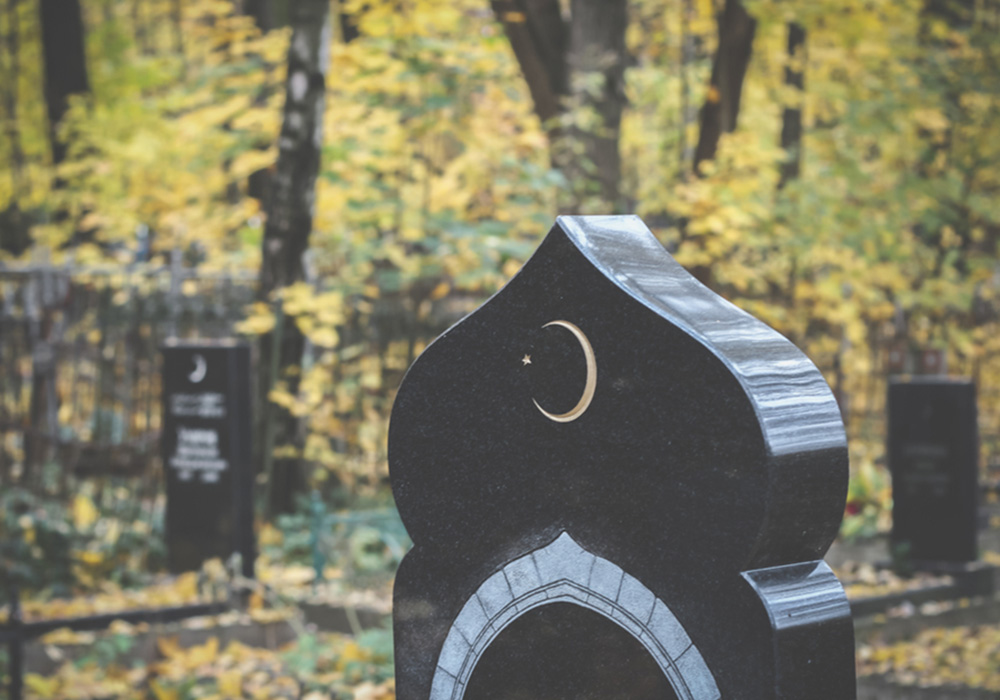
Hindus believe that after someone dies their soul is reborn into another body according to karmic deeds, with the ultimate goal of Moksha, which is when the cycle of death and rebirth ends and you finally join God.
When a person of Hindu faith dies they are ideally cremated within 24 hours. The family then collects the ashes and places them in a river or ocean – in India, the ashes would be scattered into the Ganges.
During the funeral people dress in white or colourful clothing to celebrate the life of that person and they sing Bhajans (Hindu prayers).
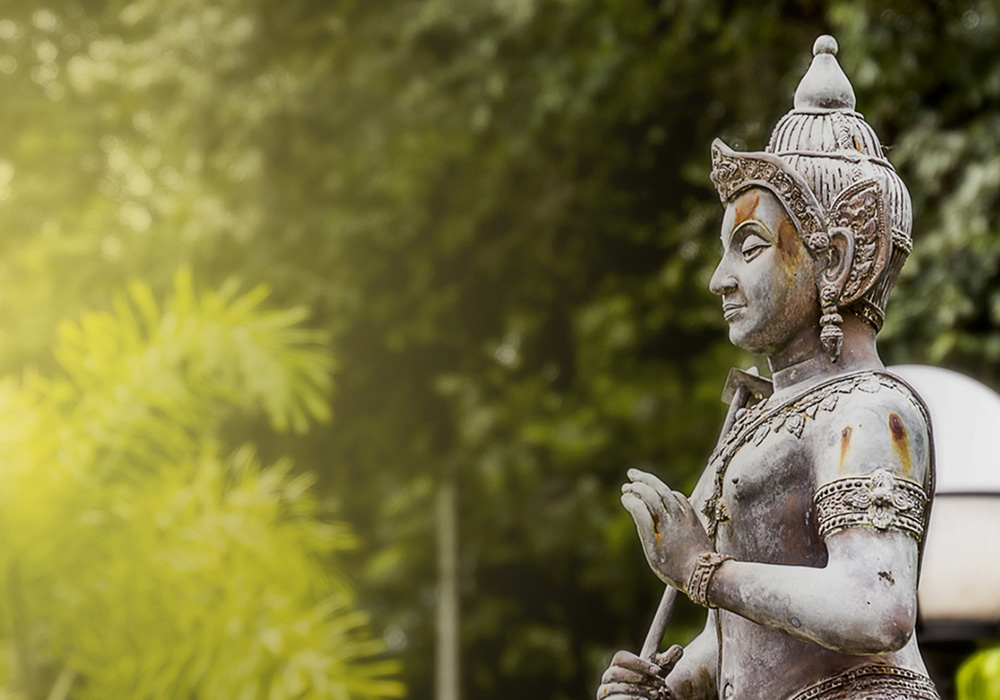
Because Buddhism is practised across many different countries and cultures, Buddhists from different cultural backgrounds conduct funeral services in different ways.
All Buddhists believe that death is only an end to the physical body of the person who has died and that their spirit continues after death, when they may be reborn. This life and death cycle is called Samsara with the ultimate goal to reach enlightenment and escape continually being reborn.
Buddhist funerals are usually simple and dignified, held at a Buddhist temple or at a family home with monks chanting, reading sermons and delivering eulogies.
Although cremation and burial are both acceptable, the majority of Buddhists choose cremation because they believe that several stages of life called bardos continue for hours or days after the body dies. This is the reason why cremation does not take place right away.
Buddhist funeral services are usually held on the third day after death, either in a monastery or at the family home. Buddhist monks lead the ceremony, reading sermons, burning incense and leading chants or sutras (Buddhist funeral prayers).
White is the traditional colour to wear to a Buddhist funeral and simple, unadorned clothing is prefered.
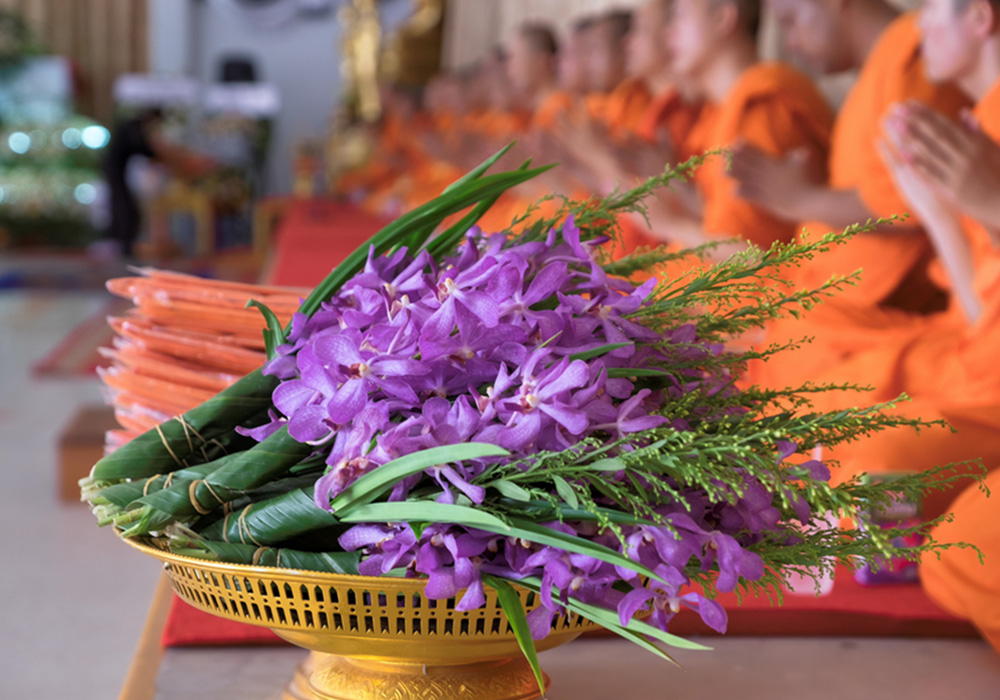
Jewish people have varying beliefs when it comes to the afterlife. Although orthodox Judaism maintains a belief in the future resurrection of the dead as part of the messianic redemption, the Hebrew Bible never mentions heaven nor hell, instead referring to “sheol”, a dark underworld where everyone goes after death.
In Judaism, funerals are usually held within 24 hours after death, with a short service of various prayers, psalms and hymns led by a Rabbi at a synagogue, a funeral home or a grave site.
After death, the body is washed thoroughly and it is guarded or watched from the moment of death until after burial. Burial is in a simple pine coffin, with the deceased wearing a simple white shroud (tachrichim).
After the burial, It is a tradition to have a get together after where food and drink is typically served. The family then sits Shiva (in mourning), a time when family and friends visit to pay their respects and remember the person who has died. Traditionally lasting for seven days, some Jews now sit Shiva for three days or even just one day. Traditional Jews cover all mirrors during this time and sit on Shiva benches. Jews do not send flowers, bringing food to the family instead.
The Jewish faith does not traditionally support cremation, preferring burials in most circumstances.
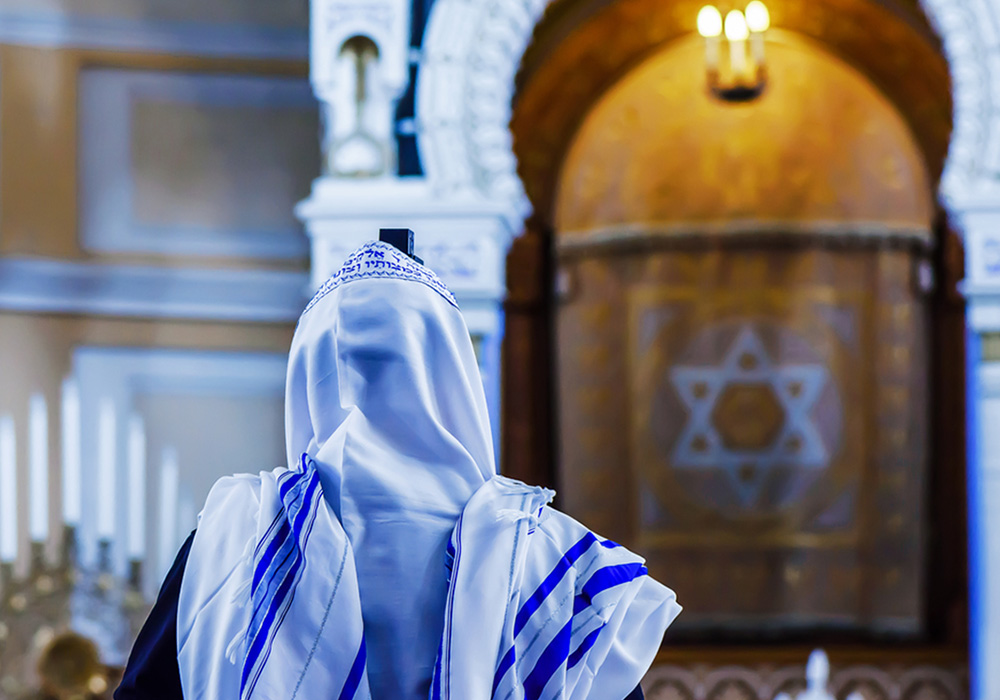
At Funerals by Design we can help you to say goodbye in a way that truely honours and reflects your own cultural and religious beliefs.
We are happy to help organise a funeral service and/or wake for a loved one who belonged to a multicultural community, had a particular religious belief or if they identified as no religion and you’re looking for help with creating a highly personalised funeral, memorial service or celebrations of life.
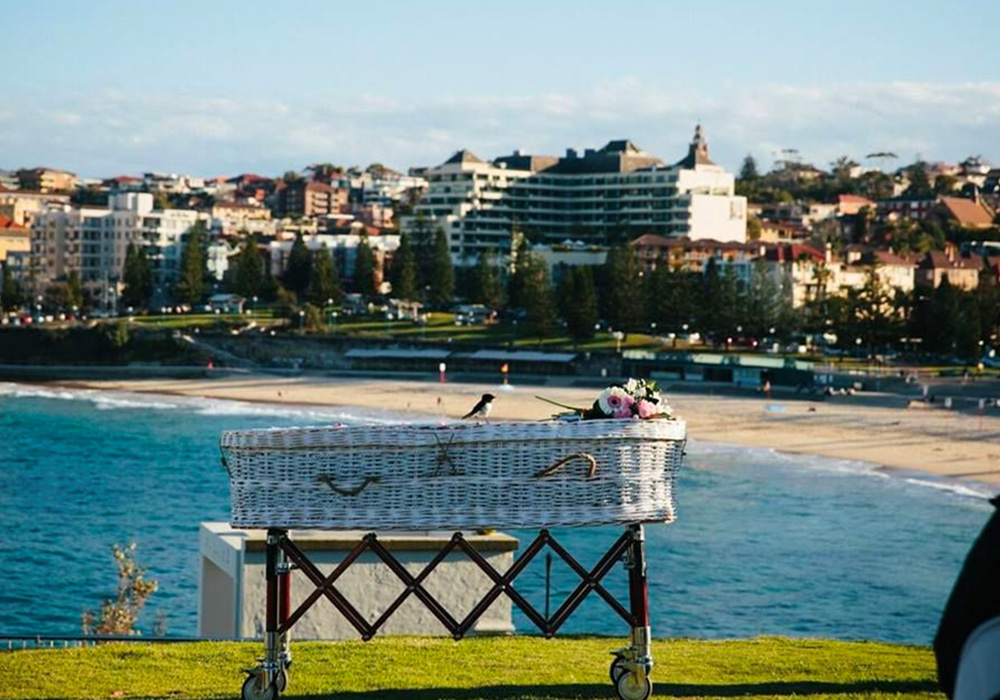
The full intensity of grief is often not felt until after the funeral service, when the “structure” and ceremony of mourning – visitation, funeral service, burial or cremation and wake – has ended and everyone else returns to their normal life.
The busyness of being surrounded by people has now been replaced by a sense of emptiness and loneliness as you begin to create a “new normal” for yourself.
After the funeral there will probably still be paperwork and possessions to be sorted and legal matters to be attended to while you adjust to the “new normal” of living your day-to-day life without your loved one.
Unfortunately, there’s no way to avoid intense feelings of grief, however these tips from other people who have also suffered the loss of a loved one may help you to get through the immediate weeks after the funeral.

Don’t set yourself a timeline for your grief or a check list of stages you have to move through. Every person’s grief will be different and whatever type of loss you’ve suffered, there’s no right or wrong way to grieve.
Whether you cry or you never shed a tear, don’t judge yourself, worry that you should grieve in a different way, or create a schedule for your grief. There’s not a “correct” way to grief and your grieving may take weeks, months, or even years.
Suppressing your grief will not make it go away, so let yourself grieve in the way that feels right for you.

Triggers for grief are often unexpected and can be impossible to avoid. What might trigger you one day will be different another day. Photos, songs, a smell, a sound, foods or seeing other people – anything that reminds you of the person you have lost may unexpectedly trigger a wave of painful emotions.
Other triggers, such as Christmas, holidays, anniversaries, graduations and birthdays, are more predictable and it can help to talk to your family and close friends about how you are feeling as you approach these dates and maybe even discussing new ways to mark these milestones and occasions.

Especially in the early days after the funeral, it is natural to feel a wide range of emotions and experience strong physical reactions to your grief, such as being overwhelmed and not able to eat, sleep or focus on anything.
You may feel as if there is no meaning to anything anymore, feeling numb, empty, confused and exhausted. Anger that your loved one has gone and left you behind is also a common reaction.
Many people experience feelings of guilt about the last thing they said to their loved one, unresolved disputes or even not being there with them as they died. Or they worry about how others expect them to grieve, how to move on or they wonder if they will ever feel better again or be able to cope.
Whatever you are feeling is totally normal and it will eventually become easier with time as you learn to sit with these feelings – so don’t be annoyed or frustrated with yourself.
Try to treat yourself with the same tender loving care that you would give to a friend who was in the same situation.

Eating a healthy diet and sleeping when you can will give you the stamina you need to cope with your grief. And although it can be tempting to numb your grief with alcohol or drugs, in the long term they will only make you feel worse and the grief will still be there.
Spending time outdoors, gardening, walking, exercise, deep breathing, meditation, and yoga are all excellent tools to help practise self care and manage your grief.
It will probably feel quite counterintuitive when all you want to do is to hide under the doona, however spending time in nature can really lift your spirits.

Don’t try to do everything on your own even though you will probably feel like shutting yourself away from the rest of the world. If talking about your loss is just too hard, sometimes simply being around family and friends who care about you can really help.
Family and friends often don’t know what to say or how to help so don’t hesitate to tell others what you need and ask for help, even if it’s just being there to listen.
Remember, talking about your grief won’t make you a burden to your family and friends – they will want to help!
If you need further support with your grief, talk to your GP, join a bereavement support group, talk to a bereavement counsellor or call Lifeline – 13 11 14 – for 24-hour crisis support from a trained health professional.
Have you been through a traumatic event, as a result of loss or grief?
Grief and loss in some cases, triggers a traumatic reaction. Trauma is experienced when we either directly or indirectlyare exposed to a frightening and overwhelming event. This may be an unexpected or sudden death such as suicide, death of a child, of a partner, murder, car crash or other accident, natural disaster or if the death is seen as preventable.
A traumatic experience overwhelms the body’s ability to cope. The person is unable to process the event or give meaning to it or make any sense of what has occurred. There is an inability to integrate the event – physiologically or emotionally. The experience is simply too much, or happens too soon, or too fast.
Everyone reacts to traumatic experiences differently. Here are some signs and symptoms of trauma:
These are all normal human responses to a traumatic experience and everyone’s reaction to grief, loss and/or trauma is completely individual.
The body’s natural reaction to trauma is to trigger a survival response in the brain – flight, fight or freezereaction. Ournervous system is designed to protect us from a potential threat from harm, as we no longer feel safe. Everyone’s response is different as are their previous life experiences. We usually just react, rather than having time to think about a response. For example, people in ‘fight’ mode may feel agitated, heart rate increases and the breath may shorten. In ‘flight’ mode, we may try to leave, escape or avoid the situation. If you move to ‘freeze’ mode, you may go blank or have an inability to make decisions.
Some people find that they are able to work through their traumatic grief experience with a trusted friend/s or family members who understand, or have lived experience.
Many find independent support with a professional counsellor useful in working through what has occurred. Make sure the counsellor is a good fit for you. If not, give yourself permission to look around further, until you find the right support, where you feel heard and understood to work through your trauma experience.
Jane Macnaught
Tranquillo Place
Grief Trauma Anxiety Counselling
www.tranquilloplace.com
You may also like to contact the Griefline
https://griefline.org.au/contact-us/
Live streaming webcasts of funerals and memorial services allows family or friends to watch from anywhere in the world, on any device and at any time, providing a valued and permanent online digital tribute.
Whether you call it webcasting, a virtual funeral or memorial services or funeral live streaming, restrictions on numbers and lockdowns during the Covid pandemic have meant that many funerals, memorials and celebrations of life are increasingly being held online as well as in person.
Even as these restrictions start to lift and borders reopen, live streaming webcasts of funerals and memorial services has now become a common and expected part of funerals and memorials, because they allow family or friends to watch from anywhere in the world, on any device and at any time. Professional live streaming also provides families and friends with a valued and permanent online digital tribute.
If you’re considering live streaming a funeral or a memorial, we’ve put together answers to the most frequently asked questions about funeral live streaming, webcasting, and virtual funeral and memorial services.

Our professional team of videographers will organise everything for you.
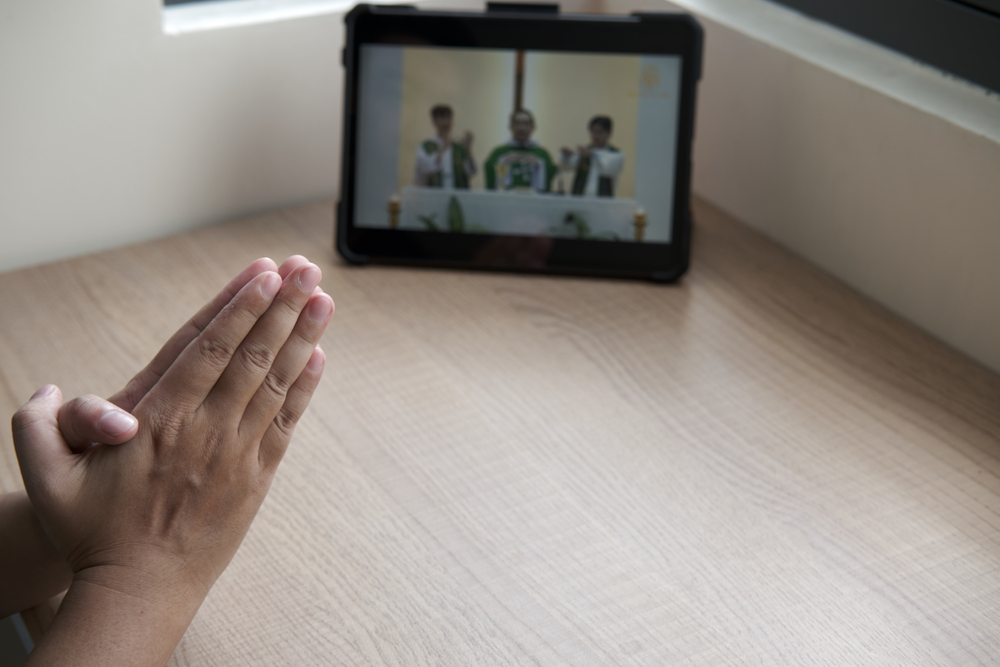
We create a private online event with a link to join the live streamed funeral or memorial service. Either you can send out the invitations to friends and family or we can do it for you.
Just before the funeral starts (we recommend at least 15 minutes before the service in case they have any problems with their internet connection or logging in on their device) the invitees click on the link to access the live stream, click on ‘join the meeting with audio’ and then on ‘start video’.

Our live streamed funerals and memorial services can be watched both in real time (as the funeral happens) as well as any time after the funeral. All you need is an internet connection and a smart device.
This livestreaming technology has been designed to be viewed anywhere in the world on any device, such as your smartphone, tablet or computer, without any need to download an app or software.
You can decide who you will invite to the funeral and who the link is shared with, however there is no limit to the number of people you can invite to watch the webcast funeral or memorial, both in real time and after the event.

After the funeral live streaming, the event will stay online for one month, giving everyone plenty of time to download the recording to watch later and keep forever.
Although many people prefer to view the live stream as it happens, they often may want to revisit and rewatch it at a later date. Others may not be able to view the webcast funeral or memorial at the time it is live, so they will appreciate being able to watch it later.
And for all friends and family, the downloaded webcast will become a valued tribute video, preserved safely, professionally and permanently online, forever.

Our professional live streamed funeral webcasts start at $650.

What you wear to a live streamed funeral will depend on what you would like to do and what the family has requested, eg, please wear pink to support breast cancer charities, or please wear purple as it was Michelle’s favourite colour.
Even if you decide to keep your camera off while watching so nobody can see you, dressing up for the occasion as if you were there in person will help you to feel like you’re a part of the service – even if you are on the other side of the world.
Although the live stream is usually one way, we can provide friends and relatives the opportunity to deliver a live eulogy or reading if they are unable to be there in person.
If you are participating remotely, make sure you have a good internet connection, someone to help you in case of any technological glitches, a quiet and enclosed space, and think about the background that will be behind you when you go live.
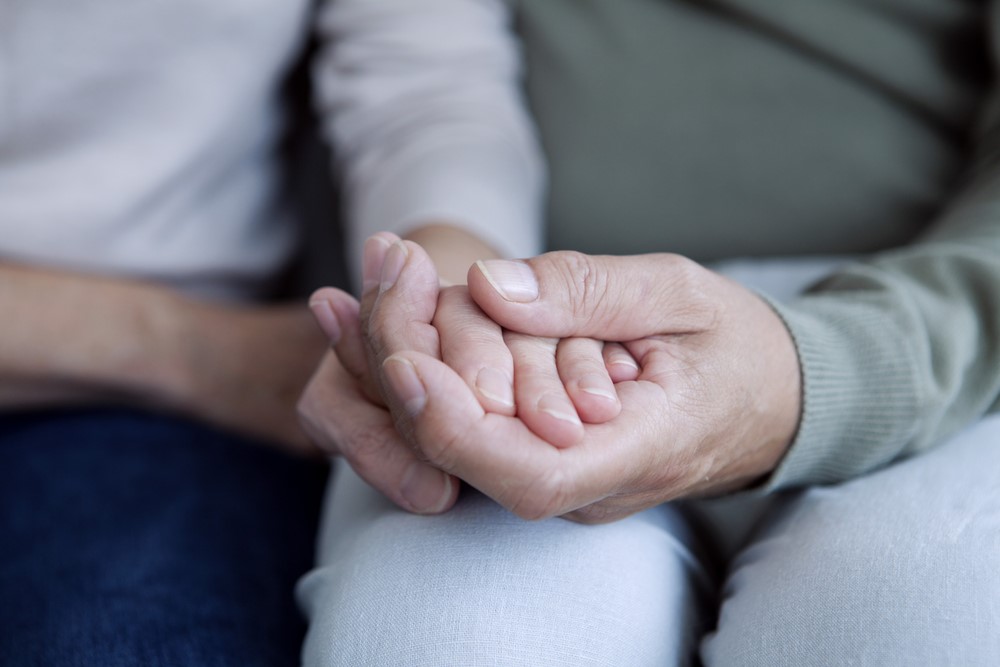
If you struggle with technology or are attending the farewell of a loved one, you might feel unsure and alone watching a live-streamed funeral by yourself.
In person, funerals are not a solitary event so watching a livestream funeral or memorial with close friends or family can be very comforting.
At Funerals By Design we offer discreet, high quality and affordable live streamed funeral and memorial services from greater Sydney to anywhere in the world with our professional and experienced videographers, Stephen Lee from CeremonyCast and Chris Whiting from Fish Media.
If you have family or friends living overseas or interstate who can’t be here in person to attend a funeral, our professional live streaming really is the closest thing to being there in person. Find out more.
We’ve created this step-by-step guide to help you create a fitting tribute to your loved one without it sounding like a CV or a chronological list of their life events … AND keep yourself together while delivering it.
Just remember, although writing a eulogy may be one of the toughest things you’ll ever do… it can be the most rewarding!

Write down all the facts and stories you remember about that person, such as their age, childhood, siblings, education, job, marriage dates, places lived, children, etc.
Now think about how you know that person.
Don’t try to become a sudden expert on their work life, for example, if you were their child or grandchild. Keep it real and focus on the person you knew, your relationship to them and the context you knew them in.
Sometimes there will be more than one eulogy, so work together to make sure you’re not repeating the same information.
If there is only one eulogy and you are presenting it, do your research and talk to people who did know the other aspects of their life, especially those who shared years of friendship and memories. There will often be more than the stories you remember… ask others to contribute their memories too.
Don’t be afraid to ask for help because it’s also a good way to help heal the hurt others might feel if they had wanted to speak at the funeral but weren’t asked.

No matter how well people think they know the deceased, they often come away from a funeral learning something new and interesting about another part of that person’s life that they were not a part of.
The sort of things people want to hear about the person who has died, include:
Remember that everyone at the funeral had a different relationship with the person who has died, so always be inclusive and acknowledge those relationships in your eulogy. A good way to make a eulogy more inclusive is to include stories that also involve friends and family members who are present.
Write the eulogy in a way that anybody listening could understand what was being said about the deceased even if they didn’t know them at that stage of their life.

A eulogy is not the time nor the place to focus on negative or unpleasant aspects of the deceased’s life.
Mourners do not want to or need to hear about:
Although there is certainly a place for humour, this is not an opportunity to “roast” the deceased and you should always remain respectful.

Lists are long and boring. People remember stories and connect through stories.
It is impossible to summarise the events of a whole life into one eulogy – you cannot include everything. Save some stories and events to be shared at the wake or in a more appropriate context with the friends and family who will find these more detailed stories meaningful.
Many eulogy writers fall into the trap of composing a chronological list of events to illustrate the life of the deceased – these types of eulogies are long and boring and often sound like a CV. Instead, think about the key stories and quotes that best illuminate the life of your loved one.
To organise the structure of your eulogy, write down all your thoughts and memories on small cards or post-it notes. You can then arrange these in a logical order once you’re ready to structure your eulogy.
If you’re uncertain where to begin, one way to approach it is to write a letter to your loved one. Although you probably won’t deliver the eulogy in this format, it will help you to keep it personal.

Ask your family and friends to read through the draft of your eulogy, identify any errors, provide feedback on the structure/flow of your eulogy and offer suggestions on other material you might want to include.
If you are not used to speaking in public, the best way to practice is to read your speech aloud to yourself in front of a mirror and then in front of family and friends.
To help polish your eulogy delivery and work out timing:

If you are the only person delivering a eulogy aim to make it between 5-10 minutes long. If there are several eulogies, try to keep it to 3-5 minutes long and talk to the other people delivering eulogies to ensure you are all focusing on different aspects of the deceased’s life and not repeating the same stories.
Don’t forget to let the minister or funeral celebrant know how long your eulogy will be so they can plan the length of the funeral.
If you’re worried that you might become overcome with emotion while delivering the eulogy, have a close family member or friend stand next to you. Ask the minister, funeral celebrant or friend if they would be willing to take over if needed and give them a copy of the eulogy.
Knowing you have a backup speaker will probably be all you need to give you the strength and confidence to be able to deliver the eulogy.

Delivering the eulogy is a privilege and honour, the ultimate and last gift you can give someone you love.
Above all, be yourself. Don’t try to be too funny or too serious if that is not your personality.
Remember to breathe and know that everyone in the room is rooting for you and that it is okay to show emotion. It’s okay to smile, giggle and laugh…after all, life is fun, not sad!
Be proud of yourself…It is said that most people would rather be in the coffin than give the Eulogy.
To find out more about ways the team at Funerals at Design can help you with any aspect of planning a funeral, burial, cremation or a wake, get in touch. We’re here to help!
If the formality of a traditional church funeral or the impersonality of a crematorium service just doesn’t feel right, you’re not alone. Increasingly, families are looking for ways to personalise funerals and wakes and create meaningful farewells that truly reflect the person who has died.
As well as serving favourite foods of the deceased at the wake and sharing stories and favourite memories, here are some additional ways you can put the personality back into the funeral or wake, rather than a one-size-fits-all approach.

Rather than spending thousands of dollars on a formal, highly lacquered coffin or casket, there are now many cheaper, more environmentally-friendly alternatives that can also be personalised.
Cardboard coffins can be decorated with paper, fabric or drawn on either before or during the service.
Woven wicker coffins can be decorated with flowers or even have items of meaning to the deceased, such as handbags, attached to the sides.

If there is no coffin or urn, a memorial table can be used as the focal point for the memorial as a tangible reminder of the person who has died to help guests feel their presence at the service and the wake.
Items you might want to place on the memorial table may include a framed photo of the deceased surrounded by:
These items could also be used as decorations and given as a thank-you gift to attendees at the end of the wake.

Colour is a simple but wonderful way to brighten the event and bring all the guests together.
What was the favourite colour of the deceased? Were they passionate about a sporting team or the colours of the flag of the country where they were born?
Ask everybody to wear the particular colour or colour combination and use it to decorate the venue with bunting, streamers, serviettes, tablecloths, flowers, candles etc.
Photos spark memories and lead to people sharing stories. This is such an important part of any funeral and memorial but it can take a bit of time to organise so enlist help and ask close friends and family to share their photos with you.
Photos can be presented both physically and digitally as a slide show – a great job to give to the more technical members of the family.
Use photo boards, hang photos on a line of string with mini pegs, have an entire table of framed photos from around their house, scatter photos around the tables in the venue so people can see different photos wherever they move to.
You could also ask guests to BYO a copy of their favourite photo of the deceased, which is a great way to collate photos from all parts and stages of their life.

Is there a family member or friend who could perform a song that was special to the deceased? Was there an instrument they loved to play? You can also include the words to songs on the order of service if you want everybody to sing along.
Use special songs as a soundtrack for a photographic slideshow that is played at the funeral or the wake. Create a Spotify playlist of the deceased “greatest hits” to be shared with all the guests or uploaded to the living memorial website.

A journal, memory jar, chalk board or memorial stone station allows family and friends to write memories and messages over the duration of the wake.
You can also record memories digitally if guests feel comfortable being recorded. Ask a question such as “Where did you meet the person?” “What was your favourite memory of that person?” or even asking them to share something about the deceased that others might not know.
If you’re planning your own farewell, you might want to record messages to your loved ones as a living reminder of what you looked and sounded like or handwrite letters or cards.

Allocate enough time for an open mic session during wake so people can open up and say something in an informal way that doesn’t involve the stress of preparing a formal speech or a eulogy.
If people are comfortable being recorded, the open mic session can be added to the living memorial as a way to add layers of memory from different perspectives and different parts of the deceased person’s life.

If the person you are farewelling loved board games or jigsaws, have game stations or their treasured jigsaws scattered around the wake and encourage guests to participate. Maybe even host a game night in their honour.
Did your loved one do the crossword or other puzzles every morning? Creating a crossword puzzle or word search that asks questions about the deceased or represents their favourite things and passions and give a copy of the puzzles to everyone at the wake.

What were their favourite foods and drinks? Were there recipes they were famous for cooking? Was there a particular cuisine they enjoyed? A food or drink that represents their culture and heritage?
Mix up jugs of their favourite cocktail or create a gin or whiskey tasting station. Serve craft beers or VB – what did they like? Hire a coffee van or a mobile pizza oven. Bring in sushi platters or create grazing plates. Serve red wine with their favourite cheeses on a platter.
The ideas are endless for creating food that reflect the tastes of your loved one.

It is customary at a wedding for the bride and groom to give a small gift to their guests and this can be done at a memorial service, wake or a celebration of life too.
There are so many gift ideas that you can personalise to reflect the deceased.
If a house has to be emptied (and especially if the deceased was a collector), you could also hand out thank you gifts such as thimbles, teacups, handbags, spoons, men’s tools, playing cards, crystal glasses or vases, artworks, vinyl records, books or magazines from their collection, scarves, or t-shirts.
Whether you’re organising a funeral or a wake for a family member or planning your own farewell, there are so many ways to honor and reflect the personality of your loved one or to ensure you can “go your own way”.
If you would like some help with personalising a funeral or a wake, get in touch. We’re here to help.